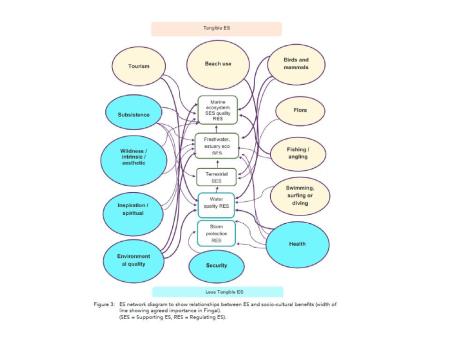
Resource description:
Abstract
The concept of Ecosystem Services (ES) is relatively new to environmental policy. ES provided by the natural environment are recognised as an important contributor, directly and indirectly, to human well-being. These include the ecosystem’s provision of natural commodities (e.g. ag- ricultural products, forest products etc.), its ability to regulate environmental quality (e.g. by providing clean water, pollination, regulating climate, etc.) and the ability to provide cultural services in the form of attractive landscapes, settings for recreation, and spiritual enrichment. This guidance explains how the Ecosystem Services Approach (ES Approach) can be used to secure better public input into planning and policy design at local, and potentially regional or national, level. Many national or EU policies and laws as well as local level plans and strategies can have an influence (positive or negative) on the quality of the natural environment. Policies and plans can also interrupt the flow of ES or enhance them. Valuation of ES (socio-culturally or economically) can demonstrate the benefits of these services to people and therefore indicate how policy or plans may affect them positively or negatively. Increasingly, there is interest in how economic activity, land-use and development can affect the ability of ecosystems to continue to provide important services to people. Dealing with these complexities is familiar territory for policy decision makers. The ES Approach introduces a new perspective which explicitly demonstrates our dependence on the natural environment and how it should be managed in a way that recognises its service capabilities. Under this new model, decision makers must not only consider the impact of change on environmental quality, but also how it affects the ability of the environment to continue to provide essential ecosystem services to people. This, in essence, is the ES Approach to decision making. This guidance is based on outputs from the EU-FP7 funded OPERAs research project (2013- 2017) on the Operational Potential of Ecosystem Research Applications (www.operas-project. eu).
Author/Contact:
Deirdre Joyce, ESLA, 36 Glenbeigh Road, Cabra, Dublin 7. IRELAND
Craig Bullock, OPTIMISE/UCD, Richview Campus, Clonskeagh, Dublin 4. IRELAND
Marcus Collier, TCD, University of Dublin, Dublin 1, IRELAND
Requirements:
- Knowledge of ES stakeholder and public consultation methods
- Knowledge of Participatory GIS methods (PPGIS)
- Interested stakeholders/participants and decision makers
Advantages:
- Social learning of participants about the value of nature to their health and wellbeing
- Non-adversarial public consultation generating ex-ante and ex-post data (before and after)
- Structured outputs that can inform land use planning (PPGIS maps, value ranking, values landscape
Constraints:
- Staged instrumental-deliberative model which may be considered time consuming
- Transaction costs may be considered high (knowledge and resources needed to delivery public consultation)
- May raise expectations of participants about what can be delivered locally/nationally
Uses of this resource:
- Land use strategies plans
- Development Plans
- Strategic Environmental Assessment
- Environmental Impact Assessment
- Green Infrastructure Planning
- Heritage Plans
- Local development
- Tourism plans
- Public consultations about environmental policy choices
- Conservation consultations
- Parks and wildlife consultation
- ES and natural capital advocacy
- Cultural Mapping and identification of Cultural ES
DOI reference:
doi: 10.13140/RG.2.2.19338.16320
Licence:
- Free, no licence
Development stage:
- Full, working product
Quality assurance:
- Scientific peer review
- Own QA and testing